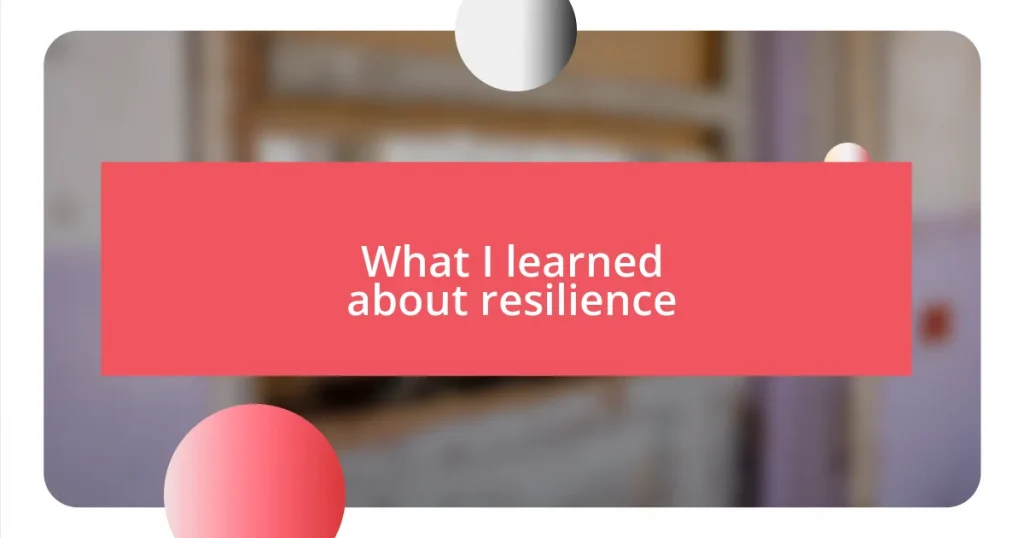Key takeaways:
- Resilience is about adapting and learning from challenges rather than merely enduring tough times; embracing vulnerability can lead to personal growth.
- Key factors for building resilience include cultivating a supportive network, maintaining a positive mindset, and embracing change as a catalyst for growth.
- Effective strategies for developing resilience involve practicing mindfulness, setting realistic goals, nurturing self-compassion, and actively seeking support in challenging situations.
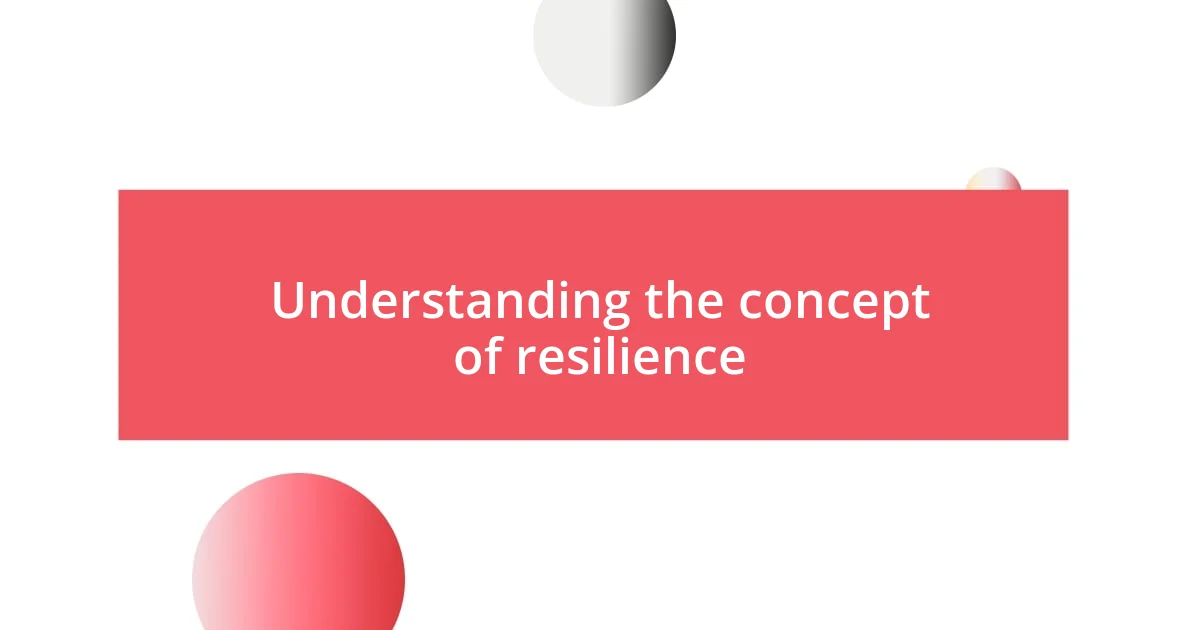
Understanding the concept of resilience
Resilience can often be misunderstood as simply getting through tough times without breaking. From my experience, it’s more about how we adapt and bounce back from challenges, learning and growing in the process. Have you ever found yourself in a situation where you thought you wouldn’t make it, only to discover a newfound strength? That’s resilience in action.
In my journey, I’ve faced setbacks, like an unexpected job loss that felt overwhelming at first. At that moment, it seemed like my world was crumbling. Yet, looking back, I realize that this experience pushed me to explore new opportunities and ultimately led me to a path I never would have considered otherwise. Isn’t it fascinating how adversity can sometimes redirect us toward success?
What I’ve come to understand is that resilience isn’t just about enduring; it’s about harnessing our emotions and using them as fuel for growth. When we embrace vulnerability, we allow ourselves to feel and process our emotions, which can be incredibly healing. I often wonder, what if we all chose to see struggles as stepping stones rather than obstacles? This shift in perspective can be transformative.
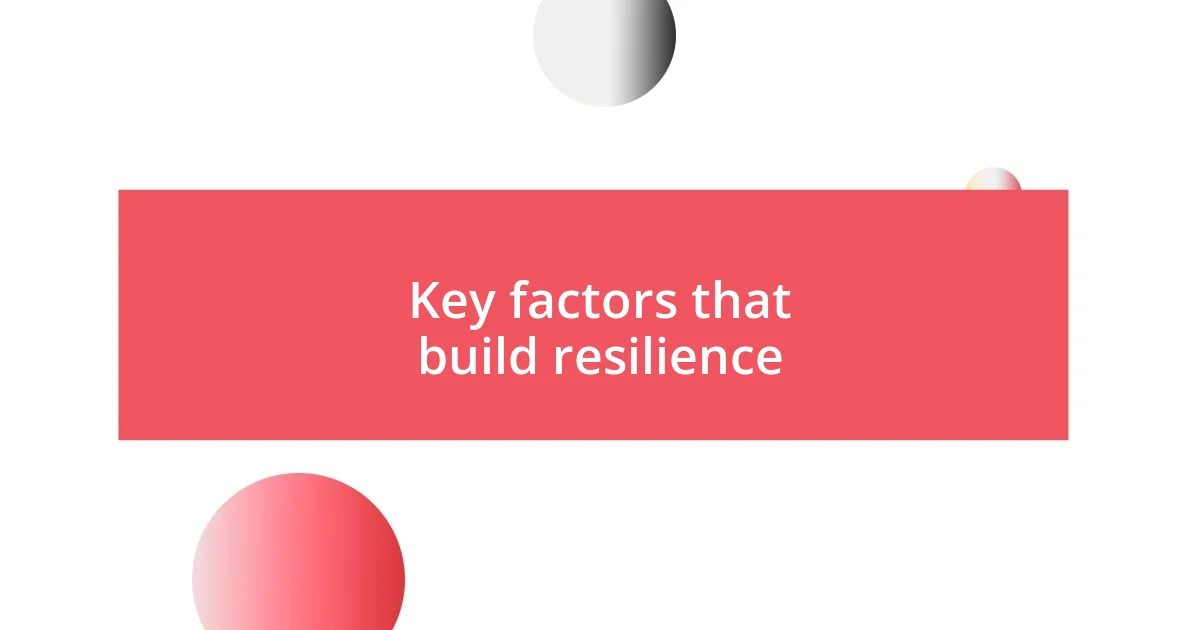
Key factors that build resilience
Building resilience involves several key factors that often intertwine. One crucial element is the support system we cultivate around ourselves. In my own experience, having friends and family to lean on during difficult times made all the difference. It’s comforting to know that you’re not alone; having someone to share your feelings with can help lighten the emotional load. Do you have a support network that uplifts you?
Another factor that contributes significantly to resilience is maintaining a positive mindset. There was a period in my life where I faced multiple hardships, and I realized that focusing on the positives, even in the darkest times, kept my spirits high. When I concentrated on gratitude instead of dwelling on what went wrong, my outlook shifted dramatically. It’s incredible how the way we frame our thoughts can influence our capacity to recover.
Lastly, the willingness to embrace change plays a pivotal role in building resilience. Change can be intimidating; I remember when I had to relocate for a job, leaving everything familiar behind. Initially, it was unsettling, but embracing that change opened up new opportunities and experiences I would have otherwise missed. Change is often the catalyst for growth, don’t you think?
| Key Factor | Description |
|---|---|
| Support System | A strong network of friends and family can provide emotional backup. |
| Positive Mindset | Focusing on gratitude and the positives can help us recover. |
| Embracing Change | Accepting change can lead to unforeseen opportunities and growth. |
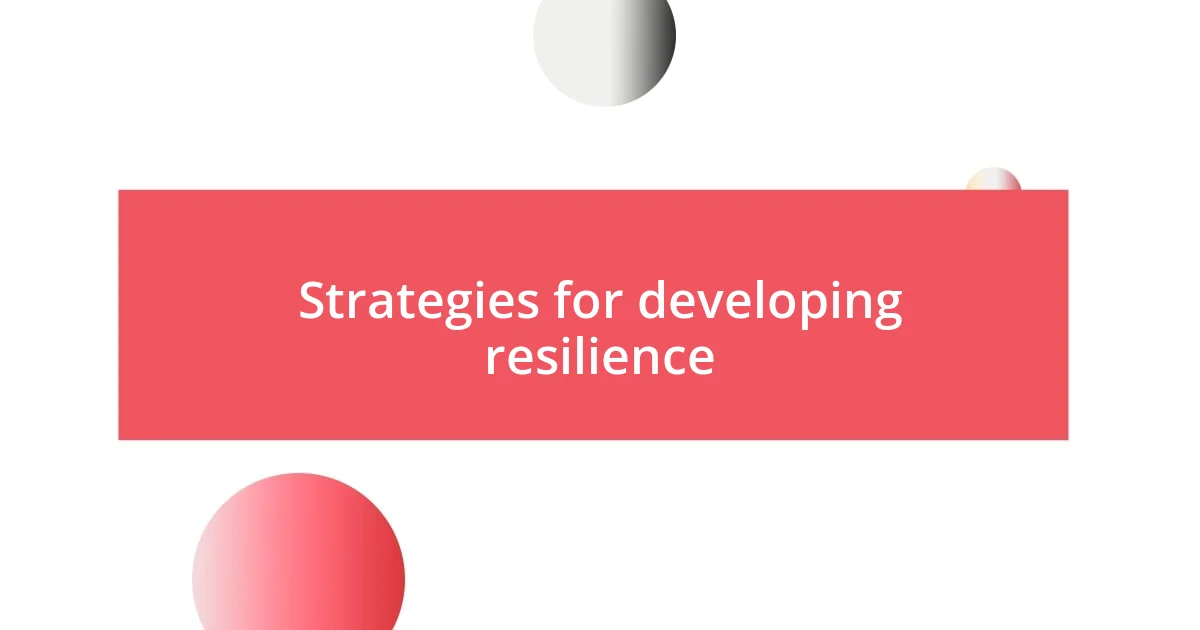
Strategies for developing resilience
Developing resilience requires intentional strategies that can help us navigate life’s uncertainties with greater ease. From my perspective, one of the most impactful approaches is cultivating self-awareness. I remember a time when I felt overwhelmed by stress, and it was through journaling that I discovered patterns in my emotional responses. This practice helped me identify triggers and build a deeper understanding of my feelings. Have you ever just taken a moment to reflect on what truly affects your emotional balance?
Here are some strategies to consider:
- Practice Mindfulness: Engaging in mindfulness activities, such as meditation or deep-breathing exercises, helps center your thoughts and manage stress.
- Set Realistic Goals: Break down your aspirations into manageable tasks. Achieving small milestones can boost your confidence and resilience.
- Nurture Self-Compassion: Treat yourself with kindness during times of struggle. Acknowledging that it’s okay to feel challenged is crucial for growth.
Being proactive also plays a key role in building resilience. I once found myself facing a significant challenge in my career that felt daunting. Instead of avoiding the issue, I tackled it head-on by seeking out resources and support. By actively problem-solving, I felt more empowered and capable. How empowering is it to take charge of your own narrative?
Consider integrating these strategies into your routine:
- Stay Connected: Engage with your support network regularly to share experiences and gain perspective.
- Keep Learning: Embrace a growth mindset; view challenges as opportunities to learn and evolve.
- Establish Routines: Creating a daily routine can provide structure and a sense of security, especially during tumultuous times.
By embracing these strategies, we not only fortify our resilience but also enrich our overall experience of life. What steps will you take to cultivate your own resilience?
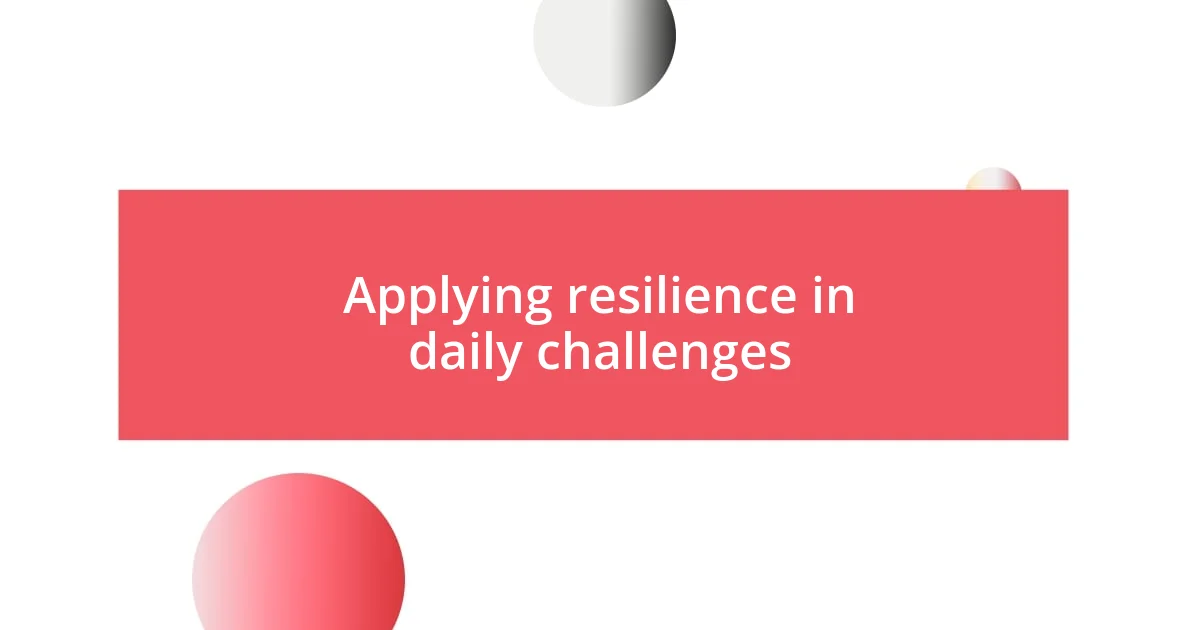
Applying resilience in daily challenges
Applying resilience in everyday life can be a game-changer when dealing with challenges. I remember a time when a sudden work project felt overwhelming. Instead of succumbing to stress, I took a deep breath and broke the task down into smaller, manageable segments. This approach not only eased my anxiety but also allowed me to feel a sense of accomplishment with every completed step. Have you ever noticed how tackling one small piece of a big problem can make it feel less daunting?
Another effective strategy I found is leaning into my emotions instead of pushing them away. During a particularly tough week, I allowed myself to feel frustrated and sad about the challenges I faced. By acknowledging these feelings, I not only validated my experience but also created space for healing. It’s often through embracing our vulnerability that we learn life’s toughest lessons. What emotions do you usually push aside when faced with obstacles?
Lastly, I strive to maintain a flexible mindset while navigating daily hurdles. Life can throw unexpected curveballs; I often take a moment to reassess my goals and adapt my plans accordingly. When my favorite project was unexpectedly sidelined, rather than feeling defeated, I redirected my energy towards a new initiative. This adaptability opens doors to alternate paths and can lead to surprising outcomes. How do you respond when plans don’t unfold as expected?
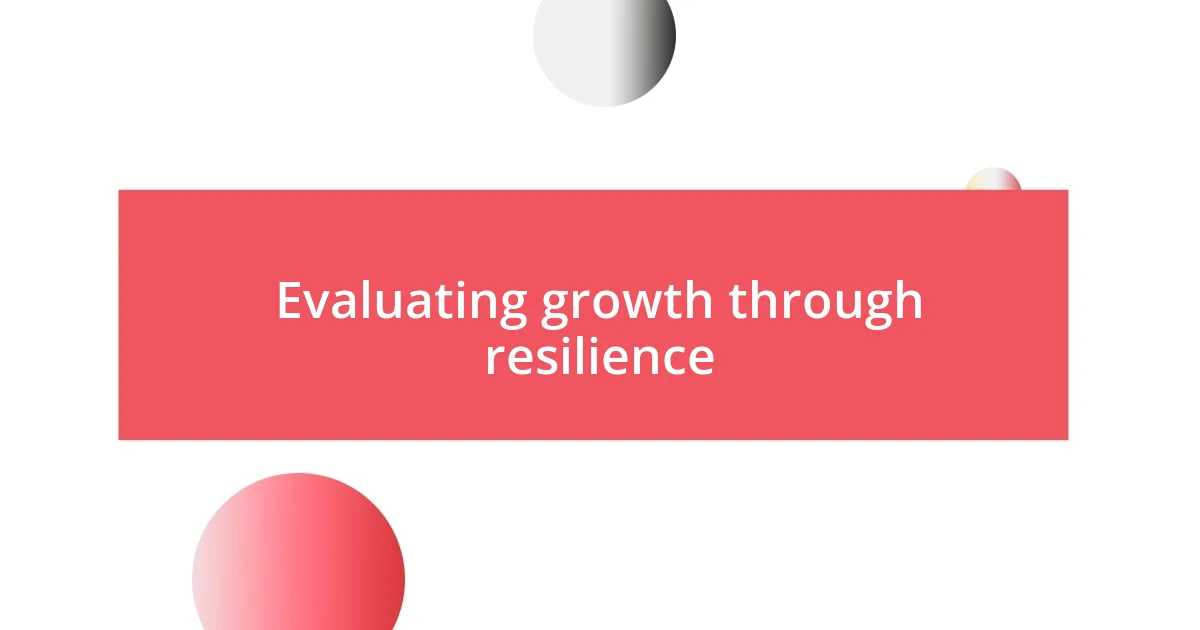
Evaluating growth through resilience
Evaluating growth through resilience often involves reflecting on how our challenges shape us. I’ve noticed that moments of difficulty, when viewed through the lens of resilience, reveal much about our inner strength. For instance, I faced a time when a relationship unexpectedly ended. Initially, I felt lost, but over time, I learned to recognize the value in vulnerability and self-reflection. That experience taught me that growth often springs from our most challenging moments. Have you ever looked back at a tough experience and realized just how far you’ve come?
Resilience gives us the ability to assess our progress and recognize shifts in our mindset. I remember feeling overwhelmed by self-doubt during college, particularly when faced with tough exams. By consciously reframing my thoughts to focus on effort over perfection, I found that my anxiety lessened. This shift not only improved my mental state but also propelled my academic performance forward. In what ways have you identified changes in your thinking during challenging times?
Ultimately, evaluating our growth means embracing and learning from adversity. I’ve often turned to feedback from friends and mentors when reflecting on my personal development. Their insights have illuminated blind spots in my resilience and encouraged me to adopt new strategies. When I sought their opinions after a failed project at work, I discovered fresh perspectives that reshaped how I approached challenges. How do you utilize external feedback to deepen your understanding of your resilience journey?










